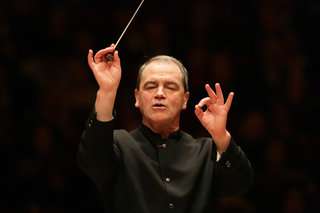|
Back
Songs without Words Houston
Jones Hall
09/24/2010 - and September 25, 26, 2010
John Adams: Doctor Atomic Symphony
Richard Wagner (arr. Lorin Maazel): Der Ring ohne Worte
Houston Symphony, Hans Graf (conductor) 
H. Graf (© Chris Lee)
If the momentum of the first two concerts of the season continues, this could be an extremely exciting and memorable year for the Houston Symphony. The performances of the present repertoire, superlative in every respect, see conductor and musicians carrying full-blooded operatic drama and dynamism onto the stage of Jones Hall. With confident, spectacular brass playing headlining the excellent contributions from each of the orchestra’s sections, Hans Graf’s juxtaposition of these two apocalyptic work is riveting, convincing and memorable.
I saw Doctor Atomic, the opera, at the Netherlands Opera in its premiere there and found the vocal writing and libretto (as well as much of the staging) problematic, but the orchestral music fascinating and rollicking. Adams’ decision to craft a single-movement symphonic essay from his opera’s material is a smart move. The opera’s centerpiece, Oppenheimer’s “Batter my heart, three person’d God” aria, is transcribed as a brilliantly virtuosic trumpet solo, here perfectly rendered, and creates a powerful centerpiece for the symphonic work. I am not quite convinced by the overall structure of the piece as a one-movement “symphony.” Comparisons with the one-movement essays by Sibelius and Barber simply cannot be avoided, and those two composers’ architectural ingenuity is consistently apparent. In his Doctor Atomic Symphony, Adams seems to be searching for new ways to create a powerful denouement after some incredibly energetic buildups, but those overwhelming and hair-raising moments never seem to coalesce like they do, for instance, in his recent City Noir. The structure is exciting but diffuse and doesn’t seem to contain the structural logic that a symphony should.
Qualms with the music itself are irrelevant in this masterful performance. Graf and his players convince with awesome precision, especially in the scuttling string figures after the granitic introduction. Individual contributions are also superb. The aforementioned trumpet work a highlight, but the tremendous playing from the principal trombone and tuba also deserve special mention. Graf is superb at handling Adams’ rhetoric. His conducting is expressive yet strict, and his balance of the complexly layered rhythmic patterns makes one hope from more of this composer’s works under this baton. This is the type of performance that should be being released on recording to represent Houston’s orchestra.
Much the same could be said of Lorin Maazel’s misguided Der Ring ohne Worte. The Ring already exists “without words.” The standard orchestral tableaus, played in order of their occurrence in the operas, a la George Szell’s stupendous recording with the Cleveland Orchestra, tell the same story as Maazel’s curiously tied together highlights. Maazel chops sections up at random, while leaving others fully or nearly in tact. The introduction to Das Rheingold is presented nearly complete, but here it isn’t a prelude to fifteen hours of music drama but to a single hour of orchestral music. The proportions are all wrong. It’s great to have Dawn and Siegfried’s Rhine Journey also included, nearly complete, but the bleeding chunk of the Ride of the Valkyries eschews that moment’s structural rigidity in the opera and in the standard orchestral extract. We don’t get the Magic Fire Music closing out the end of the Walküre section, so its return at the immolation fails to make a motivic connection in the audience’s mind. The oddities abound.
Again, whatever the misgivings one might have with Maazel’s reworkings of the music, Graf and the orchestra play as if their lives depend on it. Graf’s tempos were surprisingly swift, especially in the Ride of the Valkyries. Principal horn William VerMeulen plays Siegfried’s calls with swagger, and leads his augmented section in some glorious horn playing, echoed by the rest of the brass section. In the quiet Forest Murmurs, the woodwind soloists played with subtle rubato and gossamer tone, while the strings were unctuous and aching in the love music. Contrabassoon and bass clarinet were gutsy and menacing. Indeed, this was an hour of pure Wagnerian bliss. One wonders if Houston will ever see Graf in the pit at the Houston Grand Opera leading Die Walküre. It could prove to be a match made in heaven.
In all, the evening was a satisfying helping of outstanding opera playing that more than overcame any structural deficiencies in the music. This concert enchanted the audience, presented a major piece of music by a living composer, and showed Graf as an exciting, visceral interpreter. The path for a magnificent season has been laid, and I for one am eager to continue on the journey.
Marcus Karl Maroney
|